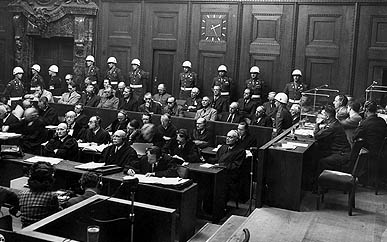
Image Credit:
Nuremberg Trials Library, Harvard Law School Library
My teaching primarily focuses on forensic rhetoric and the role of narrative, memory, and proof in disputes about past events. This classically includes legal disputes, although it extends far beyond them. In the course I’m teaching now, entitled Rhetoric and the Law, I challenge students to consider the importance of rhetoric to interpretations of evidence in legal disputes, the use of analogical argument in appeals to precedent, and the significance of the adversary system of justice as a dispute resolution model. One of my goals is to encourage the collaborative study of argumentation around topics of public controversy in the spirit of the classical rhetorical exercise known as in utramque partem, in which students learn to discover arguments on opposing sides of controversial cases. I particularly strive to accomplish this by emphasizing the value of casuistry, or case-based reasoning, and the close reading of evidence in trials. This presents a problem of access, however, because while trial records are generally public they’re often not readily available outside of the courts.
The problem of accessing trial records is unfortunate because trial transcripts are excellent sources for the study of argumentation and rhetorical concepts in particular cases. Trials are formally structures argumentation in which legal disputes are narrowed through a process that derives from classical stasis theory, in which both sides are given time to be heard and introduce evidence and rebut the other side, and in which everything that is said is spontaneously recorded. As Robert Ferguson writes, because trial transcripts reflect complete records of court proceedings they reveal, “as nothing else quite can, the real preoccupations in the flow of legal argument,” supplying a better perspective for understanding “the formulation of story that lies at the center of all courtroom proceedings.” See Robert A. Ferguson, “Becoming American: High Treason and Low Incentive in the Republic of Laws,” in The Rhetoric of Law, edited by Austin Sarat and Thomas R. Kearns (Ann Arbor: Univ. of Michigan Press 1994), 103. The opening and closing arguments in trials provide excellent sources for rhetorical study.
To try to make these resources more accessible to my students, I’ve identified various electronic and print resources that make trial transcripts available either in whole or in relevant excerpts. Because many court transcripts are now being electronically generated and scanning technology is more readily available to upload electronic files of older trial transcripts, many trial transcripts are now available online. The following constitute a sampling of the transcripts from famous court cases, both old and new, available online:
Cameron Todd Willingham Trial Transcripts
Clarence Darrow Digital Collection
Eichmann Trial: The Complete Transcripts
The Leo Frank Case and Trial Research Library
Leonard Peltier Trial Transcripts
Lizzie Borden Trial Transcripts
The O.J. Simpson Trial Transcripts
Proceedings of the Mary Surratt Conspiracy Trial
Transcripts of the Salem Witch Trials
West Memphis Three Trial Transcripts
In addition to these resources, there are some excellent print sources of transcripts. Among these are various volumes within a collectible book series under the imprint of the Notable Trials Library. Many of these volumes contain extensive excerpts from the world’s most famous trials. In addition, the following print sources contain opening and closing statements from famous and relevant summaries of the evidence introduced in the trials:
Michael S. Lief and H. Mitchell Caldwell, The Devil’s Advocates: Greatest Closing Arguments in Criminal Law (New York: Scribner, 2006)
Michael S. Lief, H. Mitchell Caldwell, and Ben Bycel, Ladies and Gentlemen of the Jury: Greatest Closing Arguments in Modern Law (New York: Scribner, 1998)
Joel J. Seidemann, In the Interest of Justice: Great Opening and Closing Arguments of the Last 100 Years (New York: Regan, 2004)
These resources reflect exceptional laboratories of sorts for the study of rhetorical concepts, and I’ve found that students enjoy analyzing trial rhetoric and it often serves to demystify courtroom proceedings.

